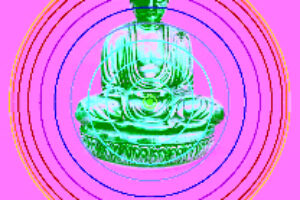
This line from Master Dogen’s Fukanzazengi follows after “You already have the good fortune to be born with a precious human body so…” So the admonition to not waste your time meaninglessly is implicitly connected to the teaching that birth as a human being is the pivotal condition (J. yoki) for awakening to the insight of Buddhism. Thus spending time in pursuit of any other goal would be a waste of time, in Dogen’s world.
However, in lay practice, we honor the demands of family, work or career, household and office or factory, and consider all our daily actions to be part of our practice. In the give and take of everyday life, it seems impossible to “stop the functioning of the mind” by “thinking neither good nor evil, right or wrong, not only in meditation but in all your daily actions,” as we are reminded by Dogen.
This encourages us to remember that Zen practice, like other creative endeavors, allows for making mistakes, as necessary to making progress. We must be able to fail, in order to succeed, as is the case in the sciences as well as the performing and plastic arts.
zenkai taiun michael elliston, roshi
But when something comes literally from out of the blue, as in the recent meteor strike in the mountain skies of Russia, we are reminded of the tenuousness of our grip on existence, and indeed the fragility of the entire ecosystem on our home planet. Invisible forces, such as the asteroid that passed within 17,000 miles of Earth—coming closer than our orbiting satellites, not to mention the moon—is a wakeup call. It reveals the sobering reality of what one expert commentator referred to as the “shooting gallery” through which Earth is hurtling, vulnerable to the potential impact of innumerable celestial bodies. In this context a mere 10-ton meteor is so small as to be undetectable. The impact of an asteroid instead of near-miss that occurred on the same day is unimaginable.
Meanwhile, the powers that be, internationally as well as domestically, are busily engaged in issues which appear absurdly irrelevant in this context, wherein they are unable to confront even the consequences of climate change. Perhaps it is too much to expect that mere human beings would wake up to the fact that they are wasting their time meaninglessly in service to the polity. Efforts to assure re-election to a government that will “vanish in a moment” in the event of such a cataclysmic calamity, along with the country that it is supposed to be governing, is the height of absurdity or irresponsibility.
The same expert claimed that we actually have the technology and science to pay attention to the threat from space, but the funding for all such endeavors has dried up. If governments had the will and the foresight to mount an international scientific effort, and were not distracted by next year’s election or nationalist conflicts, together they might actually be capable of to track such asteroids, and deflect them out of their trajectory and away from potential collision with the earth,
Given the current controllers of the purse strings of this country, and probably those of the other great powers of the world, we would expect to find many who would object on the grounds of religion. If it is God’s will that the Earth and all its inhabitants come to an end, then far be it from them to interfere, even if they could. We have already “God’s-will”-ed innumerable species into extinction, sacrificed to the short-term needs and wants of those who hold dominion over Creation; ongoing wars are threatening ethnic cleansing, so why stop short of allowing the ultimate extinction just because it includes the human race as well?
Given the helplessness of the situation and the hopelessness of leaning on our leadership to actually lead in the face of such daunting prospects of doom, we are left to our own devices to cope with the bleak facts of the true conditions of existence as outlined in Buddhism: impermanence, insubstantiality, and imperfection. How do we avoid wasting our time meaninglessly, given these unavoidable attributes? Plus the exacerbating factors of the stubborn ignorance of those whose daily job it is to decide our economic and ecological fate on the basis of ideology?
The construction do not waste your time meaninglessly implies, if inadvertently, that one could waste one’s time meaningfully. There is some justification for this seemingly contradictory notion, as indicated in Dogen’s Shobogenzo Uji: Existence-Time. Therein, Master Dogen makes the case for his famous expression, “Fall down seven times, get up eight.” He suggests that even when our practice is unbalanced, for example too far toward the extreme of intellectual understanding, that this practice effort is still half being-time, and so not a total waste of time and effort. Half-baked practice still contributes, eventually, to any genuine insight into buddhadharma, if and when it occurs.
This encourages us to remember that Zen practice, like other creative endeavors, allows for making mistakes, as necessary to making progress. We must be able to fail, in order to succeed, as is the case in the sciences as well as the performing and plastic arts. But Dogen’s essential message also indicates that such activities are basically a waste of time, in the bigger picture of the meaning of human life as a rare opportunity to wake up fully. This awakening is the holy grail of Zen, and rises above the aspiration to such accomplishments as the literary, the study and writing of poetry and prose, which Master Dogen himself indulged, even though he had concluded that they were basically a waste of time. What he meant, I think, is that literature for the sake of literature is not the same as literature in the service of promulgating buddhadharma.
In Buddhism, one meaning of dharma—usually translated as teaching, or truth—is law, in the sense of the way things work on a universal scale. Nothing that exists can violate this dharma, the fundamental principles of how things come to be and exist. Dharma also has the meaning of being, in that all things in their own nature manifest the truth of dharma, sentient and insentient beings alike; and each has its own unique dharma location in the scheme of things, including heavenly bodies.
Thus dharma is an inclusive term, subsuming all the teachings of Buddhism, such as karmic action and consequence, the 12-fold Interdependent Origination, the Four Noble Truths and Eightfold Path. It also embraces everyday activities of individuals and society as a whole. Here is one area that Zen crosses paths with scientific inquiry.
Science and Buddhism are both keenly interested in understanding the laws of the Universe, including those of human actions, individually as well as socially. With the recent confluence of asteroids and the intransigence of Congress, we have a truly cosmic and potentially tragic example of how humanity and its world come together, and how they may come apart at any moment. As long as we survive these close encounters of the unnerving kind, we enjoy the luxury of regarding them as even comic, rather than tragic. But this is but a variation on whistling past the graveyard.
Whether or not a given activity is a comical or tragic waste of time must be determined in context, and remains indeterminate without due consideration of intent. If writing, art, music, dance, theater, scientific investigation—and even the mundane household, family-oriented and career-related demands of daily life—are devoted to the issue of enlightenment, then they would qualify as at least half-practice along the lines of Dogen’s formula in Uji. If, however, they are indulged for the sake of entertainment, self-improvement, longevity, or any other kind of intent that falls short of Buddhism’s spiritual insight, they would qualify as a waste of time to that degree, especially so with Zen’s sense of urgency stemming from the impermanence of life.
Similarly, engaging in the outer pomp of Zen—“offering incense, bowing, chanting Buddha’s name, repentance or reading scriptures” (from Bendowa) might amount to a total waste of time, depending upon intent. Even practicing zazen, if for the sake of any of its secondary but proven everyday benefits—such as improved physical, mental and emotional health—would also constitute a relative waste of time, and further, corruption of the deeper intent of Zen. However one’s practice may look from the outside, it could constitute a totally meaningless waste of time; a meaningful but partial waste of time; or a truly meaningful expenditure of time. This is also true of the practice of others, and so is not ours to judge out of hand. All criticism in Zen is self-criticism.
The repeated near-brush with apocalypse represented by the passing stream of cosmological detritus is trying to tell us something, as is the rampant and random havoc wreaked by the rising tide or natural disasters around the globe and in our neighborhood. Damage inflicted by humankind pales in comparison, and increasingly looks like a trapped species madly turning upon itself under threat of extinction by outside forces. Whatever goals and aspirations the warmongers harbor to justify internecine strife between the tribes of the world are rendered ridiculous, and pathetic in the original sense, like ants fighting each other while the flood waters rise over their mounds. There is no question that this is a total waste of time.
Engaging in Zen practice and daily life, while mindful of this distinction, renders our various activities as true dharma—the koan of everyday life—whether or not consciously associated with the intent of the buddha way. Thus the smallest, most mundane and apparently insignificant act becomes imbued with potential revelation of the dharma. Our usual tendency toward compartmentalization is bridged, so that we can realize that there is “no gap between practice and enlightenment” in those Zen-specific actions, such as zazen and burning incense, and that “there is no gap between Zen and daily life” as well. Zen practice can become 24/7 in this way, but not as a conscious decision.
First, zazen must become the real zazen while on the cushion. Then, the halo effect on everyday life can come into play. Fortunately, we in Zen have a place to return to for sanctuary, when life comes crashing in on us with unexpected force and vehemence. We have something to do about it that always works, because its intent is precisely aligned with the existential dilemma that we face. That activity and place is zazen on the cushion.
This method, in itself, will do nothing to divert an asteroid, nor to change attitudes in the beltway by “spooky action at a distance.” But it can prepare those who practice it for the worst. And as a program of evangelism, it represents the best possible chance of changing minds and hearts around the globe—to focus on what is most important, and to stop inflicting needless man-made suffering upon the world—even if we never get around to preventing large-scale natural disasters. Master Dogen points to this supreme reality in an elegant plea to our better angels, as well as to our enlightened self-interest:
Now that you know the most important thing in Buddhism
how can you be satisfied with the transient world?
Our bodies are like dew on the grass and our lives like a flash of lightning
vanishing in a moment
What is this most important thing in Buddhism? Is it also the most important thing in life? The most important thing in international relations? In the entire cosmos?
As Master Dogen reminds again and again, we must thoroughly study this in practice.









